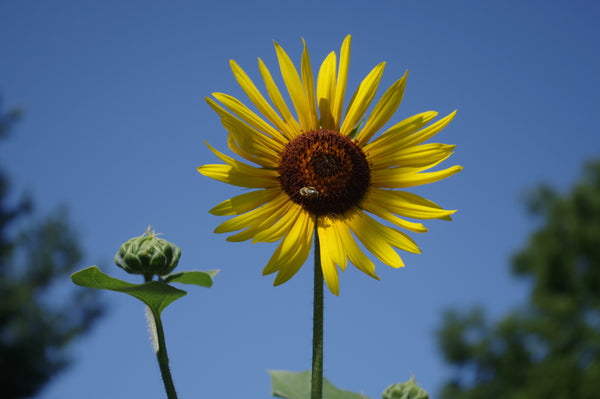
Three Seeds to Direct Sow in Your Garden this Year
Nancy DuBruleShare
Every winter, gardeners are faced with the eternal question: should I start my seeds indoors ahead of time or should I wait and direct sow my seeds in the ground? There are reasons to do both. Some plants do not have long enough to complete their life cycle if you direct sow them at the proper time. Many warm season plants, such as tomatoes, peppers, and eggplants, are always started ahead of time so that they can ripen during the warm days of summer. Cool season crops such as broccoli and cabbage, are started ahead of time and planted out in April so that they can be harvested BEFORE it gets too hot in the summer months. So, one reason to make the decision to start seeds ahead of time in the house is simple- these plants won’t work in our CT growing season if you don’t.

Peppers are tropical, warm season plants that must be started indoors in advance.
But for many types of plants, you do have a choice. You can start lettuce ahead of time OR you can sow seed directly in the ground. Same with escarole, kale, Swiss chard, marigolds, zinnias, and much more. As you read the various descriptions of the seeds on our website, you will find that each of them describes your basic options. BUT, as an experienced gardener, I have some of my own opinions about which plants I think should just simply be direct sown. Let me tell you about three of them.

- Sunflowers are magical in my garden. They attract pollinators in the summer and feed the birds as the seeds ripen. Many of them grow so big, I refer to parts of my yard as my “sunflower forest.” Have I EVER started sunflowers ahead of time in the house? NO! First of all, there is no need. If you follow the directions and direct sow the seeds after the danger of frost is past on warm soil, they will sprout very quickly. The seeds are big and easy to handle. But more important, sunflower seedlings don’t transplant easily. If you do want to start them in advance, you would want to use Cow Pots or other containers that can be planted right in the ground.

Cucumber seedlings sprout inside a floating row cover wrap in late June
- Cucumbers are another plant that I always direct sow in the garden after danger of frost has past, usually in June when the soil is good and warm. For many years, Natureworks carried cucumber seedlings in our Incredible Edibles department. And every year, the same thing would happen. Striped cucumber beetles would appear and attack the baby plants. We then had to organically treat this pest. The stress on the young seedlings was real, and many of them were weakened or didn’t survive. Eventually, we decided to just tell folks to direct sow their cucumbers AND to cover the young plants with floating row covers until they began to flower. This method WORKS. Try it.

- Summer squash is the third plant that I always direct sow in the garden. It is just SO EASY to grow summer squash from seed, I can’t imagine why you wouldn’t do so. Most summer squashes are ready to harvest in 50-65 days from seed to harvest. If you plant them on Memorial Day, we are talking the middle of July. Plus, if you plan your garden for succession of bloom, you can keep sowing summer squash seeds up until the middle of July for abundant fall harvests. Each packet of summer squash seeds has enough seeds for successive sowings. Take advantage of that fact and double or TRIPLE your harvest this year.

I invite you to use our Online Store as a teaching tool to learn more about growing plants from seed. And don’t forget to look at the many handouts available on the Natureworks website:
https://naturework.com/garden-info/handouts/
Many of them have recently been updated, and many more are newly added. Natureworks is dedicated to education and it is our mission to help YOU, our valued customers, to be successful ORGANIC gardeners.
